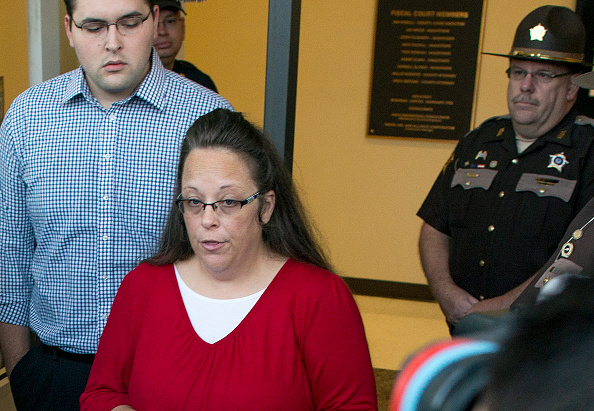U.S. Supreme Court
Once-jailed county clerk asks Supreme Court to overturn right to same-sex marriage

Rowan County, Kentucky, clerk Kim Davis at the Rowan County Courthouse in September 2015 in Morehead, Kentucky. (Photo by Ty Wright/Getty Images)
A county clerk in Kentucky who refused to issue marriage licenses to same-sex couples is asking the U.S. Supreme Court to overturn its 2015 decision finding that same-sex marriage is a constitutional right.
Former clerk Kim Davis is asking the Supreme Court to overrule Obergefell v. Hodges and to rule that the First Amendment’s free exercise clause protects her from tort liability for her religious-based refusals to grant the licenses.
Obergefell was a “flawed opinion” and “egregiously wrong,” say lawyers for Davis with the conservative Christian legal group Liberty Counsel in the cert petition filed last month.
ABC News, the Washington Blade, the Louisville Courier Journal, the Independent and the Associated Press are among the publications with coverage.
Davis was jailed for contempt in 2015 after she refused to issue marriage licenses, but she was released after six days when court employees issued the licenses. She was sued by same-sex couples she turned away and ordered to pay $100,000 to two plaintiffs for emotional distress, as well as $260,000 in attorney fees.
Obergefell held that the right to same-sex marriage is protected by the due process and equal protection clauses of the 14th Amendment. Then-Justice Anthony Kennedy’s majority opinion was joined by the high court’s four liberal justices, which at the time included Justice Ruth Bader Ginsburg and Justice Stephen Breyer.
Ginsburg has since died, and Kennedy and Breyer have retired. Kennedy and Ginsburg were replaced by appointees of President Donald Trump—Justice Brett Kavanaugh and Justice Amy Coney Barrett. Breyer was replaced by an appointee of former President Joe Biden—Justice Ketanji Brown Jackson.
Obergefell was grounded in the “erroneous fiction” of substantive due process that prohibits government infringement of certain fundamental liberty interests, the cert petition says.
Davis’ lawyers argue that the due process clause at most protects process, not substantive rights. The argument was made by Justice Clarence Thomas in a concurrence in Dobbs v. Jackson Women’s Health Organization, a 2022 decision that overturned the constitutional right to abortion.
If the Supreme Court does not eliminate substantive due process, the cert petition says, Obergefell should be overturned because the right to same-sex marriage is “neither carefully described nor deeply rooted in the nation’s history.”
“If ever there was a case of exceptional importance,” the cert petition says, “the first individual in the republic’s history who was jailed for following her religious convictions regarding the historic definition of marriage, this should be it.”
The Supreme Court will consider whether to grant cert this fall.
The case is in Davis v. Ermold.
See also:
Defiant county clerk refuses to issue marriage licenses despite SCOTUS action
Write a letter to the editor, share a story tip or update, or report an error.

